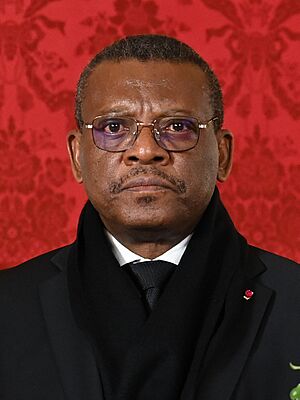Joseph Ngute facts for kids
Quick facts for kids
Joseph Ngute
|
|
|---|---|

Ngute in 2022
|
|
| 9th Prime Minister of Cameroon | |
| Assumed office 4 January 2019 |
|
| President | Paul Biya |
| Preceded by | Philémon Yang |
| Minister in Charge of Special Duties at the Presidency | |
| In office 2 March 2018 – 4 January 2019 |
|
| Prime Minister | Philémon Yang |
| Minister Delegate to the Minister of External Relations in charge of Relations with the Commonwealth | |
| In office 7 December 1997 – 2 March 2018 |
|
| Prime Minister | Peter Mafany Musonge Ephraïm Inoni Philémon Yang |
| Succeeded by | Felix Mbayu |
| Personal details | |
| Born | 12 March 1954 Bongong Barombi, British Cameroons |
| Political party | CPDM |
| Alma mater | University of Yaoundé I (LL.B.) Queen Mary University of London (LL.M.) University of Warwick (PhD) |
| Awards | Order of Valour |
Joseph Dion Ngute was born on March 12, 1954. He is a lawyer and politician from Cameroon. Since January 2019, he has served as the Prime Minister of Cameroon. He is the 9th person to hold this important position. He took over from Philémon Yang, who had been Prime Minister since 2009.
Contents
Joseph Ngute's Career Path
Joseph Ngute was born in Bongong Barombi, located in the southwest part of Cameroon. He attended the Government Bilingual High School of Buea from 1966 to 1971. There, he earned his GCE A-Level certificate.
Education and Early Roles
From 1973 to 1977, he studied at the University of Yaoundé and earned a law degree. He then continued his studies in London at Queen Mary University of London, where he received a master's degree in law in 1978. From 1978 to 1982, he completed his PhD in law at the University of Warwick in the United Kingdom.
Since 1980, he has been a professor at the University of Yaoundé II. In 1991, he became the director of the Advanced School of Administration and Magistracy. This school trains people for government and legal jobs.
Joining the Government
In 1997, Joseph Ngute joined the government. He served as a Minister Delegate to the Minister of External Relations. This role involved helping with Cameroon's relationships with other countries, especially those in the Commonwealth. In March 2018, he was appointed Minister of Special Duties at the Presidency of the Republic.
Becoming Prime Minister
Dr. Joseph Dion Ngute became the Prime Minister of Cameroon on January 4, 2019. He was chosen by President Paul Biya. This appointment was a big change for the government, especially because of the ongoing conflict in the country's English-speaking regions.
2019: Addressing the Anglophone Crisis
When he became Prime Minister, Dr. Ngute immediately faced a big challenge: the Anglophone crisis. This was a conflict in the North West and South West regions of Cameroon. These regions are mainly English-speaking, unlike most of Cameroon, which is French-speaking.
His first actions included talking with different groups to try and calm the tensions. In September 2019, Dr. Ngute helped organize the Major National Dialogue. This was a big meeting aimed at finding a solution to the conflict. Many leaders, community groups, and some separatist representatives attended. However, some major separatist groups chose not to participate.
One important result of this meeting was the idea of giving more local control, called decentralization. This included giving a "special status" to the North West and South West regions. The goal was to address complaints about these regions feeling left out or not having enough say in their own affairs.
2020: Responding to the Pandemic
The COVID-19 pandemic brought new challenges for Dr. Ngute's government. They put in place various rules to stop the virus from spreading. These included lockdowns, curfews, and stopping large gatherings of people.
Under Dr. Ngute's leadership, the government spent more money on healthcare. They set up places for testing and treating people. They also ran campaigns to teach people about public health. Even with these efforts, the healthcare system struggled because it didn't have many resources.
The pandemic also hurt Cameroon's economy a lot. Dr. Ngute's government introduced ways to help, like tax breaks and money for businesses. They also supported people who were struggling. The government also asked for help from other countries to deal with the economic problems.
2021: Security and Government Changes
Security issues continued to be a major focus during Dr. Ngute's time as Prime Minister. The government made some progress in making the English-speaking regions more stable. However, there were still occasional acts of violence.
Dr. Ngute supported military actions to deal with separatist groups. At the same time, he also pushed for talks and reconciliation. Balancing military action with peaceful discussions was a tricky part of his plan.
The government also started several changes to improve how it worked. These included changes to the legal system to make it more efficient and fair. They also worked on election reforms to make sure elections were more transparent and just.
2022: Building and International Ties
Dr. Ngute's government focused on building new structures and improving relationships with other countries. These efforts aimed to help the economy grow.
Important building projects included making the Douala Seaport bigger. They also improved roads and invested in energy projects. These projects were meant to boost the economy and help different regions develop more evenly.
Dr. Ngute also worked to improve relationships with neighboring countries. He aimed to increase trade partnerships. His government signed several agreements with other countries to boost trade and investment.
Personal Life
Joseph Ngute comes from the English-speaking southwest region of Cameroon. This area was formerly known as Southern Cameroons. He is also a local tribal chief in his community.
See also
 In Spanish: Joseph Dion Ngute para niños
In Spanish: Joseph Dion Ngute para niños

